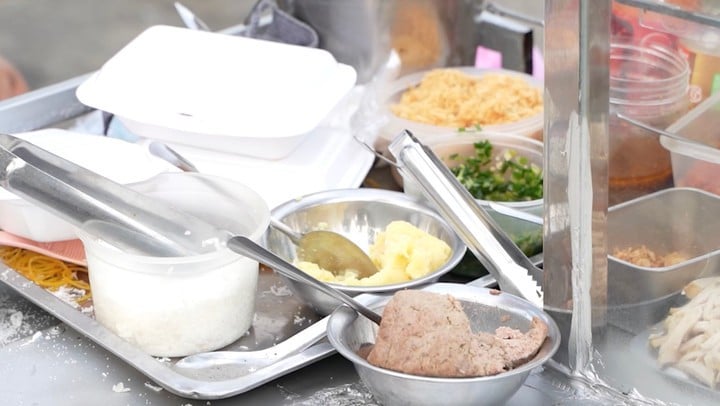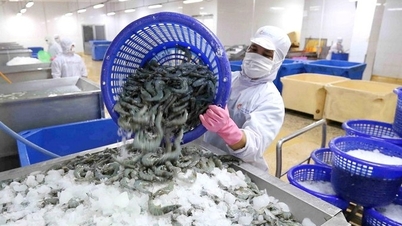Related case food poisoning after eating bread Recently in Ho Chi Minh City, according to statistics from the Department of Health , as of November 12, 316 cases of digestive disorders after eating bread have been recorded for examination and treatment. Of these, 252 cases have been discharged from the hospital and 64 cases are currently being treated at hospitals in the city.
At the Emergency Department of Tam Anh General Hospital in Ho Chi Minh City, Ms. L. said that on January 5, her company ordered 20 meals from Ms. Bich's toad bread shop. After eating, everyone experienced pain, headaches, vomiting, and diarrhea.
Lying in the emergency room right next to Ms. L., Ms. V. (28 years old) also said that she and her mother also ate bread at this shop on the evening of November 5. In the early morning of November 6, both mother and child started having diarrhea and fever. Ms. V. bought medicine to treat herself but did not respond, the fever did not subside, forcing her to go to the emergency room.

MSc. Dr. Vo Dang Toan, Department of Internal Medicine, Endoscopy and Endoscopic Surgery Center, Tam Anh General Hospital, Ho Chi Minh City said: " Symptoms such as diarrhea, abdominal cramps, fever, nausea, chills, and sometimes blood in the stool are typical symptoms of people infected with Salmonella. The condition usually lasts for several days to a week, and diarrhea may persist before the intestines return to normal."
According to Dr. Truong Huu Khanh, epidemiologist, Salmonella is one of the most common bacteria that cause food poisoning. In Vietnam, many cases of mass food poisoning have been identified as being caused by this type of bacteria.
"This bacteria can survive for a long time in the external environment, especially in raw meat, unsanitary meat and contaminated water sources. They multiply rapidly in favorable conditions, especially during the changing seasons, with a high risk of spreading," said Dr. Khanh.
Experts warn that the changing of seasons is the time of year when food poisoning is most likely to occur. Sudden changes in weather and humidity make it difficult for the body to adapt, while bacteria and viruses, especially those that cause intestinal diseases, thrive.
Dr. Nguyen Phuong Anh, Lecturer of the Department of Nutrition - Food Safety, Pham Ngoc Thach University of Medicine, recommends that in hot and humid environments, food that is not properly preserved or left at room temperature for more than 2 hours after cooking without reheating will quickly spoil. This is a favorable condition for harmful microorganisms to grow, increasing the risk of food poisoning and foodborne diseases.
People also need to be especially vigilant when choosing and using street food, because this is the food group with the highest potential for unsafety. Many vendors and street carts often use ingredients of unknown origin, without quality control, while the processing and preservation process is difficult to ensure hygiene.
Food sold right next to the road, in direct contact with dust, vehicle exhaust, heat or left outdoors for long periods of time will create conditions for bacteria and viruses to thrive.
In addition, unsanitary cooking utensils, vendors’ hands, and water sources can also increase the risk of cross-contamination. If people consume these foods, especially during the changing seasons, the risk of intestinal diseases or food poisoning will increase.
Doctors also recommend that when there are signs of suspected food poisoning such as abdominal pain, nausea, vomiting, repeated diarrhea or fever, the patient needs to properly rehydrate and replenish electrolytes with an oral rehydration solution and go to a medical facility for timely examination. Absolutely do not arbitrarily use anti-diarrheal drugs.
Cases of severe vomiting, high fever, dehydration or at-risk groups such as young children, the elderly, and pregnant women need to be closely monitored in hospital, given intravenous fluids, and given appropriate antibiotics to avoid dangerous complications.
Source: https://baolangson.vn/bac-si-canh-bao-nguy-co-ngo-doc-thuc-pham-thoi-diem-giao-mua-5065016.html




![[Photo] Action for the Community tells stories of enduring journeys – both intimate and great, yet quiet and determined](https://vphoto.vietnam.vn/thumb/1200x675/vietnam/resource/IMAGE/2025/11/15/1763179022035_ai-dai-dieu-5828-jpg.webp)































































































Comment (0)